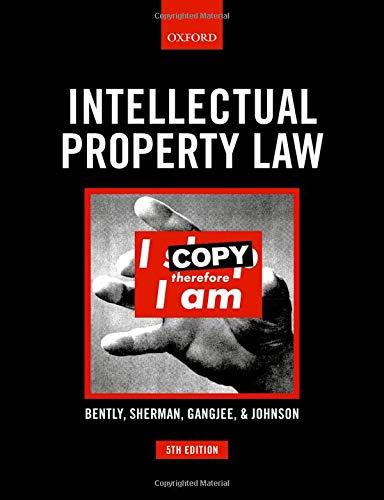Question
QUESTION 16 Which of the following is not one of the general categories of torts? Strict liability Rational Negligence Intentional QUESTION 17 How does the
QUESTION 16
Which of the following isnotone of the general categories of torts?
- Strict liability
- Rational
- Negligence
- Intentional
QUESTION 17
How does the tort of conversion of personal property differ from trespass to personal property?
- In conversion, the true owner is denied use and enjoyment of the property.
- In conversion, the true owner can recover damages for the denial of use of the property.
- In conversion, the tortfeasor treats the property as if it is her own.
- In conversion, the plaintiff is entitled to recover punitive damages.
QUESTION 18
The tort of palming off involves:
- Knowingly selling goods that are defective.
- Blaming another for one's own actions and communicating that blame to at least one other person.
- Making false statements about the goods of another.
- Representing one's own goods to be those of a competitor.
QUESTION 19
Businesses organized in the United States are subject to the laws of other countries in which they operate.
- True
- False
QUESTION 20
Under ethical fundamentalism, persons look internally and decide for themselves whether a course of action is appropriate.
- True
- False
QUESTION 21
Under the maximizing profits theory of the social responsibility of business, it is improper for a business to undertake charitable acts for the benefit of society if doing so reduces profits.
- True
- False
QUESTION 22
Which of the following statements is true regarding the relationship of law and ethics?
- The legal requirement will almost always be the same as the ethical requirement because the law is based on the ethical standards.
- In some cases ethics will require a higher standard of conduct than the law, but never vice versa.
- In some cases the law will require a higher standard of conduct than ethics, but never vice versa.
- Depending on the circumstances, the law can require a higher, lower, or the same standard of conduct as ethics demands.
QUESTION 23
Which of the following is a criticism of ethical relativism?
- Moral and ethical rules are too rigid and fixed over time.
- Some persons would take actions, which they believe to be moral, but which most persons in society believe to be immoral.
- Decisions require the measurement of qualities, which are not subject to precise measurements.
- Decisions are not allowed to take into account a particular person's station or place in society.
QUESTION 24
The theory of business social responsibility that holds that a business owes duties solely to produce the highest return for its shareholders is:
- The moral minimum theory.
- The maximizing profits theory.
- The stakeholder interest theory.
- The corporate citizenship theory.
QUESTION 25
An implied-in-fact contract is one based on the conduct of the parties.
- True
- False
QUESTION 26
A rejection of an offer is generally not effective until it is received by the offeror.
- True
- False
QUESTION 27
A promise to not inflict bodily harm on another is supported by consideration.
- True
- False
QUESTION 28
Which of the following is true?
- Contracts can be classified as either voluntary or involuntary.
- All contracts are legally enforceable.
- The terms of a valid contract become private law between the parties.
- Contract promises are generally not enforced by the courts.
QUESTION 29
The original source of the Uniform Commercial Code was:
- The U.S. Constitution.
- Congress.
- The state legislature of Delaware.
- The National Conference of Commissioners on Uniform State Laws.
QUESTION 30
All of the following agreements lack consideration except:
- A contract supported by a promise to refrain from doing an illegal act.
- A promise made out of a sense of moral obligation.
- A promise by an adult not to smoke in exchange for a payment of money.
- A promise that is based on a prior act or performance.
Step by Step Solution
There are 3 Steps involved in it
Step: 1

Get Instant Access to Expert-Tailored Solutions
See step-by-step solutions with expert insights and AI powered tools for academic success
Step: 2

Step: 3

Ace Your Homework with AI
Get the answers you need in no time with our AI-driven, step-by-step assistance
Get Started


